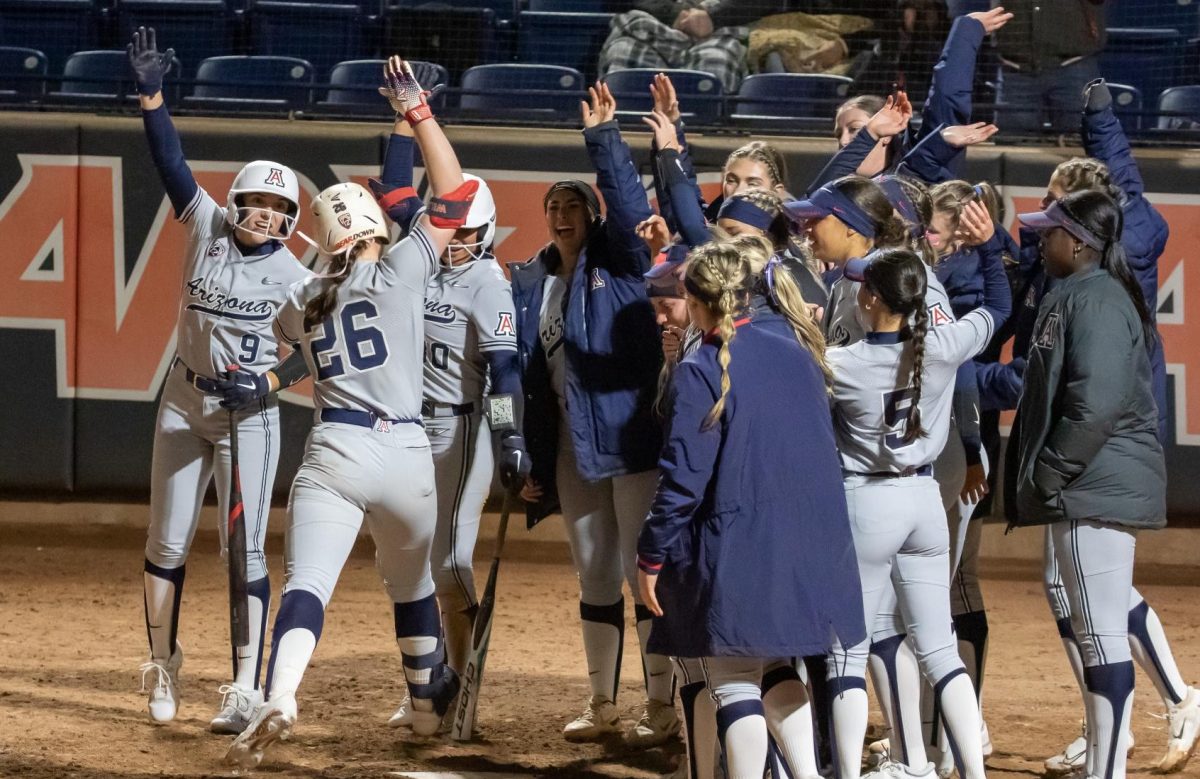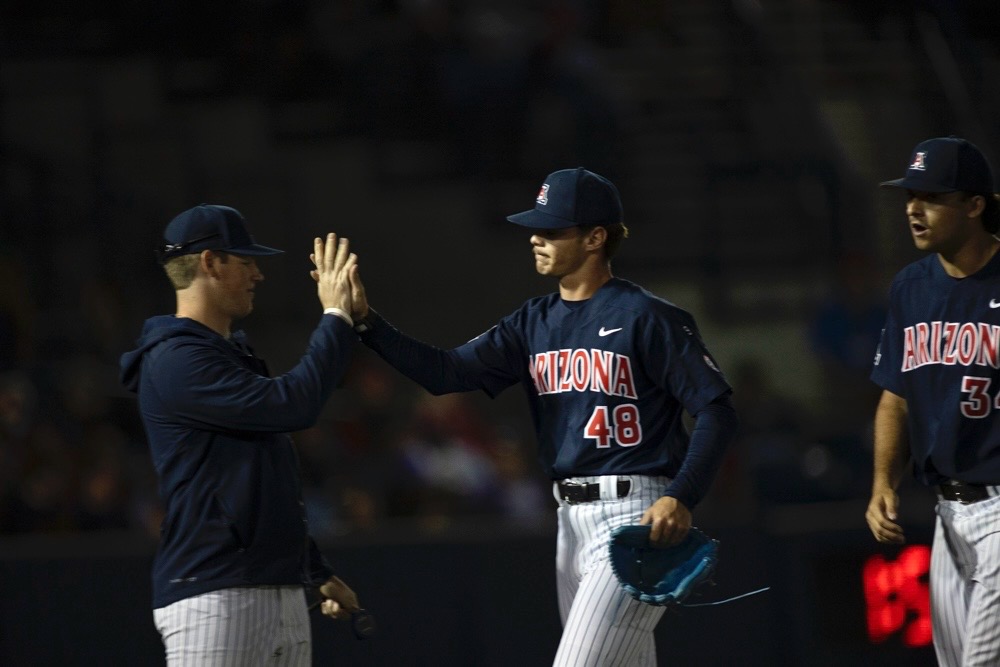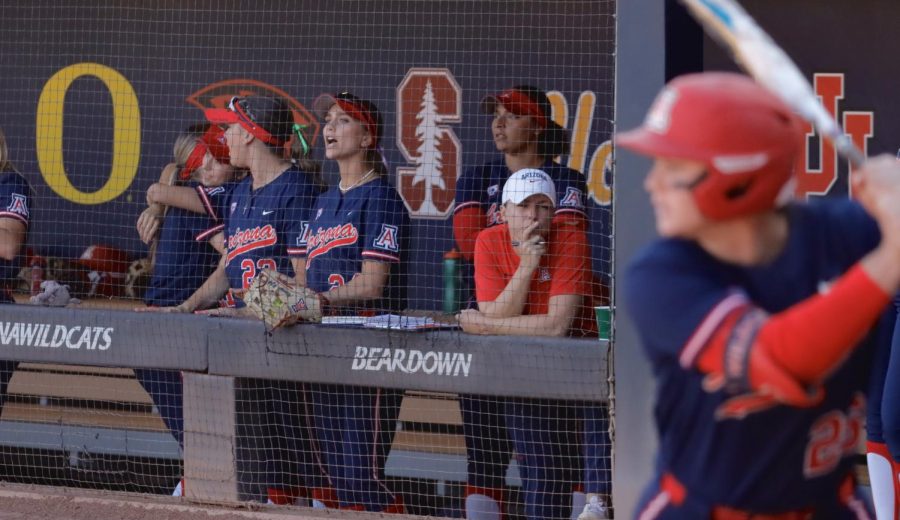For four Wildcats, the dream of being drafted by a professional baseball team on the first day of the MLB Draft was realized on June 7. Closer Matt Chaffee said he is the only one of the four that has signed a contract, while first baseman Cole Frenzel and pitcher Kyle Simon are still in negotiations. Bryce Bandilla couldn’t be reached for comment.
The Summer Wildcat talked with Simon, who was selected by the Orioles in the fourth round, Frenzel, who was selected in the seventh round by the Mets and Chaffee, who was selected in the 12th round by the Braves, to discuss realizing a dream, personal growth and the possibility of leaving the UA.
Summer Wildcat: When did you first start dreaming of getting drafted and playing professional baseball?
Kyle Simon: It’s probably everyone’s dream, but yeah, playing baseball is perfect and it’s been my dream since I was a little guy. It’s a dream come true … it’s pretty awesome and I’m excited to get started.
Matt Chaffee: Everybody, when you get to high school, you always kind of think about it, you always think about hopefully that will be me someday. When you get to college, the third year, your plan is to work toward having a good season, and then if you have a good season, not only do you help your team out but you get looked at more. I’ve always thought about it … I just knew the better I played, the better the team got and the more looks I got.
Cole Frenzel: Ever since I was a little kid, I always loved baseball. As a kid playing wiffle ball in the backyard, you dream of playing professional baseball — two outs, bottom of the ninth, all that stuff.
SW: When did you realize that playing pro ball was a real possibility?
KS: Coming to Arizona, I knew I had a better chance going there than anywhere else to extend my baseball career. It’s just a good school. But right around my freshman summer, I started to pitch against wood bats and some of the best kids in the country and dominating that league. After that, I realized that I can take this a little bit further.
MC: Probably the beginning of the season. Before that, I really hadn’t talked to anybody. After the junior day in the fall, I knew I was left-handed and threw a little bit harder than most lefties, but other than that, I never really thought about it, especially after I got hurt. I knew once the season rolled around and I got in that closer role, I got a little bit more confident about my abilities and hopefully the scouts would come out and see what I had.
CF: I was always decent growing up … when I was in eighth grade and started playing varsity, that’s when I realized I had a shot at this and could play a little bit. So I stuck with it and here I am.
SW: How did you find out you were drafted?
KS: We were at Texas A&M, and the draft started at 11 and our game started at 12, so we were in the middle of practice and everything. I ran back to my phone every so often to check if I got a call from anyone. Right after we did the national anthem, I went back and checked my phone and had about 30 text messages and some missed calls. So I realized I went somewhere, but I didn’t really know where, so when I went back into the dugout one of guys came up and was like, “”Congrats on being an Oriole,”” and I was like, “”Sweet.””
MC: As soon as I got on the bus, I had a bunch of phone calls blowing up my phone. I called my adviser and he told me what was going on because I couldn’t talk to anyone during the game. He said the Braves were really interested, and were probably going to take me in five picks. I actually found out sitting in the bathroom in the back of the bus.
CF: I had talked to a few teams the night before and in the morning, but they tell you stuff and you never know if it’s going to be legit. I found out through text messages on the bus. I was pretty disappointed with the loss, I was mad, but I found out I was drafted and it was weird, because it was one of the worst days of my life and at the same time, one of the best days of my life all in the same day.
SW: Was it bittersweet being drafted on the same day that the team was knocked out of the tournament by Texas A&M?
KS: Yeah, definitely. It’s tough to see our season come to an end, but it’s the start of a new beginning for me. It’s the last time I’m going to play with this team. But we’re all somewhat selfish, we’re all playing for the same goal.
MC: Ending our season and getting drafted, it was good and bad at the same time. It was an emotional day. I’d been with those guys for four years. I had their back every day for four years in college. We had a really good year, but it was just bad that’s the way it ended. It’s a surreal situation feeling that it’s over, then the next minute, everything I had been working for in getting drafted after getting back and getting healthy … one minute you go from the season ending with your best buddies, then the next you’re starting a whole new chapter in your baseball life.
CF: I wasn’t even concerned with the draft … we had our goal of trying to get to Omaha (Neb.), and to be a game away (from being a step closer), I was obviously pretty disappointed, angry, kind of mad. But then I read those messages and was like, “”Oh, wow.”” It didn’t really sink in, but it’s been pretty cool though.
SW: What options are you weighing in deciding to leave or return to school?
KS: It’s going to be that I most likely go (pro), and it’s just kind of figuring out where the market lies in terms of money, and what schooling I’ll get paid for when I decide to come back and finish. It’s probably going to wrap up in the next week, I’d say. It’s pretty surreal, but pretty awesome.
MC: I talked with coach (Andy) Lopez, and we had a good conversation. I’m 22 now, so if I would have come back I would be 23, going on 24. We both kind of understood that with the injury I went through, one bad throw could be the end of it. We both knew what I went through, and I didn’t want to have that what-if in the back of my head if I came back and something went wrong and I never had that shot. We talked about it, and he thought it was best that I give it a shot and see how it went, because you only get one chance sometimes in life and I felt like this was it.
CF: Right now, I haven’t signed. I’m asking over slot money for the round I was drafted — I think slot is $125,000 and I’m asking a lot more than that — so I’m waiting for them to get it approved to offer me what they’re going to offer me. After they get it approved, I’ll either take that and go play pro ball, and if I don’t like it I’ll just come back to school and hopefully have another great year with my teammates and try to get to Omaha.
SW: Have you personally talked to or negotiated with the team yet?
KS: I have an agent, and he’s doing a lot of the negotiating and a lot of contact with the area scouts that are trying to sign me. I talked to some of the head guys, but mostly with the area scout that put in the most information about me. It’s his job to sign me as quick as he can and get me out there.
CF: Yeah, I’ve talked to them quite a few times. I’ve talked to the scout that drafted me, he’s called me two or three times a week just to see how I’m doing and what’s going. I’ve been in contact with them, I’m just waiting for them to get that contract approved then get back to me so I can make that decision.
SW: What about UA will you miss most, or is making the decision the toughest for you?
KS: It’s going to be my senior year, so just being able to wake up, go to school and play baseball in the same area. That’s going to be a change … I’m going to go from having everything planned out for me to kind of doing everything on my own. It’s becoming more of a career than the hobby that it was. College is college, and I love the University of Arizona and I’m glad I got to spend three years there. Not waking up and being a Wildcat every day and that whole deal (will be tough).
MC: Probably seeing the guys every day and all working toward one goal … working with each other to get better and win the conference and then get to Omaha and win that. You can’t replace friendships, I guess. When you leave there, you still have those friendships, but we all start our own new chapters. That’s the hardest part … I’ll still talk to everybody, but you don’t see them on a daily basis. I’m just going to miss seeing those guys every day and hanging out with them all the time.
CF: I’d miss my teammates a lot — we had a great group of guys. If I do sign, I’m definitely going to miss my team, my coaches and obviously the weather in Tucson and being able to play baseball every day was a great experience. All my friends, when I came down, I didn’t know anyone over there. Tucson is a fun town, there’s a lot of support. I’m going to miss college baseball and having a chance to go to Omaha, that’s always fun.
SW: What’s the biggest change in yourself as a player since you’ve come to Arizona?
KS: I’d say just my (physical) development and my mental toughness. I started out here being 6-foot-4, 180 pounds, and now I’m 6-foot-5 or 6-foot-6 about 225 pounds. So adding weight and gaining experience with some of the best guys in the country and just gaining respect and experience through the levels I’ve gone through.
MC: Overall, probably just becoming more of a man. That’s what our program is built toward … becoming more disciplined and being a better individual toward the game of baseball.
CF: Lifting weights and letting your body grow, and just how much your strength goes up. Now I’m really strong and in really good shape, and that was a big change for me. All the hard work you put in pays off. Another change would be all the life lessons coach Lopez gives you. He teaches you a lot of stuff, not just about the game of baseball, but to be a man. Coming in, you’re just a high school kid, but now, you’re just raring to become a man.
SW: Who, other than yourself, was most instrumental in your success as a Wildcat?
KS: My parents or my coaches. They’ve gotten me through a lot of tough times and taught me how to be a man and grow up. You can’t really be not-100 percent baseball if you want to play the sport the rest of your life, so they gave me a reality check to make sure that I’m going in the right direction.
MC: That’s where coach Lopez came in … if you have a good foundation, he’ll kind of break you down and build you back up. We’re all like an empty canvas to fill, and he gives us all this information for us to receive.
CF: Everybody. It’s really a team effort. Everyone’s always helping each other out. Coaches are always telling you what you need to be doing … if they see something you’re doing or something in your swing, they’re always quick with advice.








